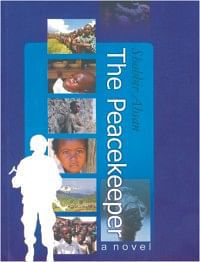
|
Home |
Issues | The Daily Star
Home
|
|
|
Dirtylaundry No, I did not make sense of the whole 'dirty laundry' shenanigan. I was only fourteen years old when I first came across it. Then three years went by, and I moved to Texas, and you know what I learned? Everyone has dirty laundry, and some people like other people in the vicinity to know about the dirty laundry, maybe even smell it, and maybe even admire it. You are about to enter the courtroom of… The cases are…silly, at best, and that is what amuses me. In Bangladesh, such 'lawsuits' would never see the inside of the court. They would be settled out in the streets, with a good old-fashioned ganjaam, with some amount of yelling and screaming and gesticulating and threat-making and bribing the policeman. Not so in the courtroom of Judge Judy. Lawsuits over a dent on a car, or a cell phone bill, or a borrowed cat. The money demanded rarely goes over a thousand dollars. But oh, how the defendants and the plaintiffs fight each other! You rented out my washing machine and didn't pay me my fifty bucks? I'm taking you to court. You broke my cell phone? I'm taking you to court. Once inside the court, though, Judge Judy picks them apart. And if the lawsuit is not dismissed, or settled for a pittance, sometimes the ruling is to no one's particular liking (except Judge Judy's). But that's okay. Human misery makes good entertainment. This is…the Moment of Truth So the contestants walk away with the wrath of a million people on their heads, barely ten thousand dollars in their pocket, and their shot at fifteen minutes of fame. Indeed, there are no losers. The Jerry Springer Show What ensues next can be best described as a cross between a Dr. Phil intervention and a WWE Showdown. The 'guests' and the injured parties will sit across the stage from each other, and Mr. Springer will ask some highly inflammatory questions, and someone or the other will jump out of his chair and lunge in the general direction of the other person. A bell will go off, and the two parties will engage in a healthy scuffle. The audience will hoot and cheer, Mr. Springer will look smug and amused, and after thirty seconds a wedge of muscled men in black T-shirts will come and break the fight up. What does the show accomplish? That's like asking what came first, the chicken or the egg. Or why the world is round, or why the chicken crossed…oh, you get my point. It makes you wonder why… By Shehtaz Huq More than anything HER feet crunched over the dew-washed brown leaves. She felt cold all over. But she didn't know why… She didn't know why she lived him even though he didn't love her. She didn't know why she did all those things even though he didn't care. But yet she didn't felt betrayed. She knew that deep down inside, he still had, he should, just an inch of that love, that care, that adoration for her. She was trapped in a vortex of confusion and anxiety. She felt helpless and disturbed without her love. She felt useless in the world of God, where only He can play the characters and throw away any He pleased. It hadn't been long that they broke up. But she never knew that it was to be like that for them. She loved him dearly, and would give away anything for him. And yet, she still loved him and would do anything to get him back. She would do anything to break away the stone that blocked her path in meeting him again. She knew that in spite of her love for him, he loved someone else; she couldn't do anything for that now. She wished he would walk the right path, and never hurt anyone like the way he had hurt her. The pain was unbearable but she didn't lose her blunt hopes of him coming back to her again. She now made her way back, and she entered her room with great grief and agony. She fumbled through her closet for that very picture of her love. She hid it away secretly, so that no one could ever lay their hands on this priceless thing. She touched the picture with her bony fingers, rough like rusted steel. But she couldn't feel the way she felt earlier. She just couldn't. It was just that his presence wore off from her side. A fat drop of tear gushed down on the thin glass. It was as if just this thin sheet of glass that kept her away from meeting her love, to touch the face and the lips of her once true love. She wiped it away, in case she would ruin her only memory of him. She now wished more that anything, that her would call her once again, she wished that her would talk to her in those sweet, melodious tunes. But she knew that it was too late…it would never happen now. She now heard her phone ringing on her bed table. “Hello?” She said with a slight sigh of solitude and the smallest light of hope. “How are you?” And as she heard this she became overclouded with joy; and her bright eyes dropped a single tear that was never meant to be like that. “I knew you'd call sooner or later…” She said with growing happiness. By Mayeesha Shafiq Foto Feature  PEOPLE say painters stroke life through brushes. Red for anger, blue for sorrow, white for tranquility, yellow for mellow and so on. The colours of emotions mark the events of life. Most of us, however, aren't born Vinci. We're simple people with complex problems that we consider the bane of our existence. However we battle through the complexities and stroke our own colours. Crayons, paint brushes or simply an old colour pencil lying at an isolated corner of our drawers. We pick one and secretly scratch through our imaginations. Like a mesmerized child filling in blank spaces on a kintergarden colouring book, we carefully fill in voids of our being with flashes of colours. We only pretend to be different from that child at play, but we all love fantasizing the brightest hues in our dreams just the way she does. PEOPLE say painters stroke life through brushes. Red for anger, blue for sorrow, white for tranquility, yellow for mellow and so on. The colours of emotions mark the events of life. Most of us, however, aren't born Vinci. We're simple people with complex problems that we consider the bane of our existence. However we battle through the complexities and stroke our own colours. Crayons, paint brushes or simply an old colour pencil lying at an isolated corner of our drawers. We pick one and secretly scratch through our imaginations. Like a mesmerized child filling in blank spaces on a kintergarden colouring book, we carefully fill in voids of our being with flashes of colours. We only pretend to be different from that child at play, but we all love fantasizing the brightest hues in our dreams just the way she does.
Kazi Tahsin Agaz (Apurbo Book review The Peacemaker  IT should have been a happy Christmas, with families reuniting over happy meals, prayers and presents. Instead, it culminated in tragedy, as the plane carrying fifteen Bangladeshi officers from the UN peacekeeping mission to Congo, crashed right after take-off, leaving no survivors. Still reeling from the shock of the news, Major Samir Iqbal finds himself posted to Congo as a peacekeeper. IT should have been a happy Christmas, with families reuniting over happy meals, prayers and presents. Instead, it culminated in tragedy, as the plane carrying fifteen Bangladeshi officers from the UN peacekeeping mission to Congo, crashed right after take-off, leaving no survivors. Still reeling from the shock of the news, Major Samir Iqbal finds himself posted to Congo as a peacekeeper.
This begins Shabbir Ahsan's debut novel The Peacekeeper. It chronicles a year in the life of a Bangladeshi military observer (milob) in Congo. Presumably an autobiographical account, it provides insight into the role of our army's role in the United Nation's efforts to tackle problems in conflicted zones. Scenes from movies like Hotel Rwanda and Blood Diamond come alive as Samir confronts the harsh reality of a country ravaged by poverty and disease despite its abundance of natural resources, prey to bouts of violence. There are haunting accounts from the victims of militant outfits; tales of brutal torture, infanticide and cannibalism that leave one chilled. Along with the scary stuff, the happy-go-lucky Samir also has happier stories to tell. He falls in love with Ikela, where he is first posted, and has many adventures there, ranging from fraudulent medicine-men trying to sell aphrodisiacs, to all-women football games where the protagonist finds himself dragged in as a goalkeeper, to his culinary exploits, and much, much more. Without going into tedious detail, he paints a charming picture of an exotic culture, or rather an amalgam of exotic cultures, because there are so many different ethnic groups involved. With a balance of humour, tenderness, suspense and action, the book is definitely a filling read. I had a little problem with the language though. In many places, it reads as though the author was thinking in Bangla, but writing in English, with literal translations. Added to that are lines and phrases of English as we Bangalis mean it, some of which is explained by the author (where he talks about what we mean by the word 'smart' and how it differs from the common definition), and sometimes it's not. There is also a kooky mishmash of dated and current slang, malapropisms, and traditional schoolroom English. That takes a lot of getting used to, but as one goes deeper into the book, it also adds to the narrative, in that it is an apt reflection on the culture of a typical Dhakaite, with our mixed influences, our local traditions and international aspirations all finding their own niches in our vernacular. Samir is witty, and brutally frank, and his honest confessions (even at his own expense) endears the reader to him, so that even his funny language seems a part of his charm, like Alex Perchov in Everything is Illuminated. So for a book that runs the gamut of emotions, all with a bit of local flavour, this is a book you want to try. The Peacemaker has been published by Shahitya Prakash, and is available locally for Tk 350. By Sabrina F Ahmad |
||||||||
| home
| Issues | The Daily Star Home © 2008 The Daily Star | |